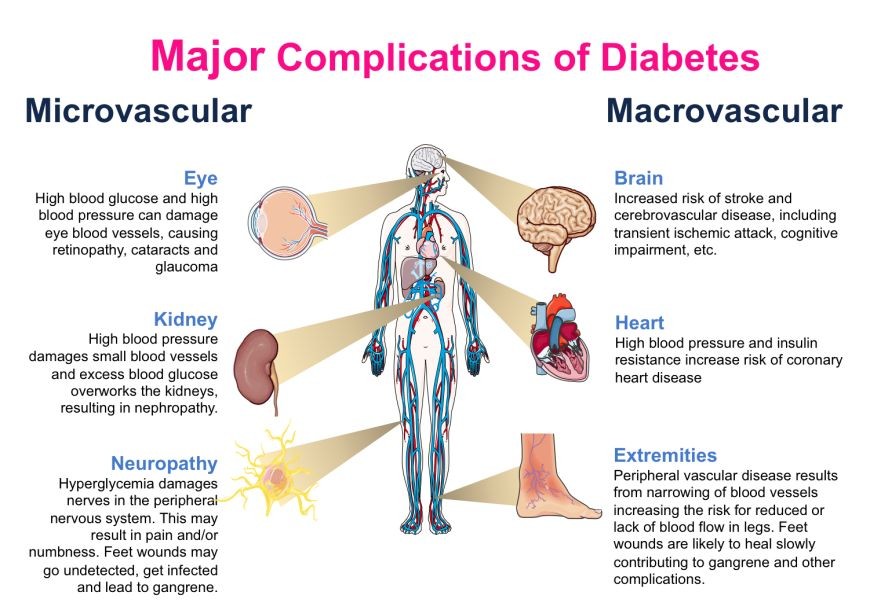
Contents
- 1 Complications of Uncontrolled Diabetes: What You Need to Know
- 1.0.1 11 Serious Complications of Uncontrolled Diabetes
- 1.0.1.1 1. Cardiovascular diseases
- 1.0.1.2 2. Neuropathy
- 1.0.1.3 3. Retinopathy
- 1.0.1.4 4. Nephropathy
- 1.0.1.5 5. Foot issues
- 1.0.1.6 6. Skin issues
- 1.0.1.7 7. Oral complications
- 1.0.1.8 8. Hypoglycemia
- 1.0.1.9 9. Hyperglycemia
- 1.0.1.10 10. Diabetic ketoacidosis (DKA)
- 1.0.1.11 11. Hyperosmolar hyperglycemic state (HHS)
- 1.0.2 What Happens When Diabetes Goes Uncontrolled?
- 1.0.3 What Is the Most Common Cause of Uncontrolled Diabetes?
- 1.0.4 Can You Recover From Uncontrolled Diabetes?
- 1.0.5 Tips for Managing Diabetes
- 1.0.6 Preventing Diabetes Complications: What You Should Do
- 1.0.1 11 Serious Complications of Uncontrolled Diabetes
Complications of Uncontrolled Diabetes: What You Need to Know
Many people with diabetes experience complications later in life due to poor management or unawareness of their condition. When diabetes is left uncontrolled, it can lead to high blood sugar levels and a range of life-threatening complications.
11 Serious Complications of Uncontrolled Diabetes
1. Cardiovascular diseases
- Elevated blood sugar levels increase the risk of cholesterol deposits building up on blood vessel walls.
- These deposits eventually form plaques that narrow the arteries, impairing blood flow and leading to atherosclerosis.
- Ruptured plaques can trigger the formation of blood clots, which may block smaller arteries and result in oxygen deprivation, increasing the risk of heart attacks and strokes.
2. Neuropathy
- Uncontrolled diabetes can damage arteries, impeding blood circulation to the nerves and causing reduced nerve function.
- High blood sugar levels can also affect the nerves’ ability to transmit messages, leading to diabetic neuropathy.
- This condition can manifest as peripheral neuropathy in the arms and legs or affect major organ systems, resulting in various symptoms and complications.
- Even the autonomic nervous system, including the nerves of the heart, can be impacted.
3. Retinopathy
- Most people with diabetes develop some form of eye disease, such as retinopathy, which can lead to impaired vision or blindness.
- High blood sugar levels, high blood pressure, and high cholesterol are major contributors to retinopathy.
4. Nephropathy
- Over time, high blood sugar levels can build up in the blood vessels of the kidneys, impairing their ability to filter blood and eliminate waste through urine.
- Diabetic nephropathy, a common complication of uncontrolled diabetes, can cause kidney damage and increase the risk of developing renal issues.
- In severe cases, dialysis or a kidney transplant may be necessary.
5. Foot issues
- Uncontrolled diabetes can lead to foot and leg sores that are challenging to treat and may result in infections.
- In some cases, amputation may be necessary.
- Diabetes can also cause nerve damage in the feet, resulting in numbness and tingling sensations.
6. Skin issues
- Diabetes can cause extremely dry skin, especially on the soles of the feet, due to damage to blood vessels and nerves in the body.
- Dry skin can be more prone to infection if scratched.
7. Oral complications
- Improper management of blood sugar levels can increase the risk of gum inflammation (periodontitis).
- Periodontitis is a leading cause of tooth loss and has been linked to a higher risk of cardiovascular disease.
- Regular oral check-ups are essential for early detection and treatment of any oral problems.
8. Hypoglycemia
- Hypoglycemia occurs when blood sugar levels fall too low.
- Incorrect use of diabetes medications can cause dangerously low levels.
- Symptoms include a rapid heartbeat, pale skin, fatigue, shakiness, anxiety, and difficulty speaking.
9. Hyperglycemia
- Hyperglycemia occurs when blood sugar levels are excessively high.
- Short-term effects may include increased thirst, frequent urination, blurred vision, fatigue, and headaches.
- Long-term hyperglycemia puts every organ and system in the body at risk of significant damage.
10. Diabetic ketoacidosis (DKA)
- DKA is caused by excess ketones in the blood and can result in a diabetic coma or even death.
- When glucose is unavailable for energy, the body breaks down fat, leading to ketone production and increased blood acidity.
- Type II diabetes is more commonly associated with DKA, and hospitalization is often required.
11. Hyperosmolar hyperglycemic state (HHS)
- HHS occurs when blood sugar levels remain abnormally high for an extended period, causing acute dehydration and disorientation.
- This condition typically arises when the body doesn’t produce enough or properly utilize insulin.
- Excessive urination due to high blood sugar levels can lead to severe dehydration and excessive thirst.
- Uncontrolled type II diabetes increases the risk of HHS.
What Happens When Diabetes Goes Uncontrolled?
Uncontrolled diabetes means that your blood sugar levels, or HbA1c, are significantly higher than normal. A blood glucose level of 180 mL/dL or higher is considered high.
Diabetes is a disorder in which the body cannot properly utilize or produce enough insulin, resulting in elevated blood glucose levels. Glucose is unable to enter cells, causing individuals to crave more food. People with uncontrolled diabetes often experience polyphagia, an excessive urge to consume calories.
If you receive a diabetes diagnosis, your healthcare professional will likely recommend treatment options to help you manage your condition. However, failing to adhere to the treatment plan or being unable to do so can worsen your diabetes, leading to uncontrolled blood sugar levels.
What Is the Most Common Cause of Uncontrolled Diabetes?
In some cases, individuals may be unaware that they have diabetes. Type II diabetes often develops slowly, with few early warning signs, until blood sugar levels become uncontrollable. Severe hyperglycemia resulting from uncontrolled diabetes is most commonly associated with type II diabetes, although both type I and II diabetes can be uncontrolled.
In the absence of insulin, glucose produced during digestion remains in the bloodstream instead of entering cells. Without intervention, blood sugar levels rise, leading to severe illness.
To prevent uncontrolled diabetes, regular monitoring and control of blood sugar levels are essential. Uncontrolled diabetes can arise due to various reasons, including:
- Inadequate nutrition or poor diet
- Insufficient physical activity
- Other health issues that may interfere with diabetes treatment
- Other medications that can interact with diabetes treatment
- Incorrect dose or wrong type of diabetes medication
- Skipping doses of diabetes medication
- Mental health disorders, such as depression, that can impair diabetes management
QUESTION
Can You Recover From Uncontrolled Diabetes?
Diabetes is a treatable condition. Lifestyle modifications, such as low-calorie diets, weight loss, and exercise, can lead to long-term remission in over 80% of people with diabetes. Many individuals can achieve complete diabetes remission and live without medications.
Bariatric surgery may be an option for severely obese individuals with a body mass index greater than 40 kg/m2. However, this procedure is only recommended for a small percentage of people with diabetes who are severely obese.
Tips for Managing Diabetes
Effective management of diabetes is crucial for preventing dangerous complications. Here are some lifestyle adjustments that can help control blood sugar levels:
- Eat a balanced diet: Include enough protein and fiber, especially from whole grains, non-starchy vegetables, beans, and legumes. Avoid sugar and processed carbs that can spike blood sugar levels.
- Engage in regular exercise: Physical activity helps lower blood sugar and pressure levels while improving blood flow. Aim for 30 to 60 minutes of daily exercise, but consult your doctor before starting a workout program.
- Take medications as prescribed: Oral medications are commonly prescribed for type II diabetics, while type I diabetics require insulin therapy. Adhering to your medication regimen is essential for maintaining healthy blood sugar levels.
Preventing Diabetes Complications: What You Should Do
- Get regular checkups: If you have a significant family history of diabetes but haven’t been diagnosed, schedule frequent check-ups and have your A1c levels measured regularly.
- Focus on a healthy diet: Consume fewer carbohydrates and fats while increasing your intake of fruits and vegetables.
- Maintain ongoing communication with your healthcare provider: Keep your physician informed about your blood sugar levels. If your readings are outside the target range, contact your provider immediately to make necessary adjustments to your treatment plan.


